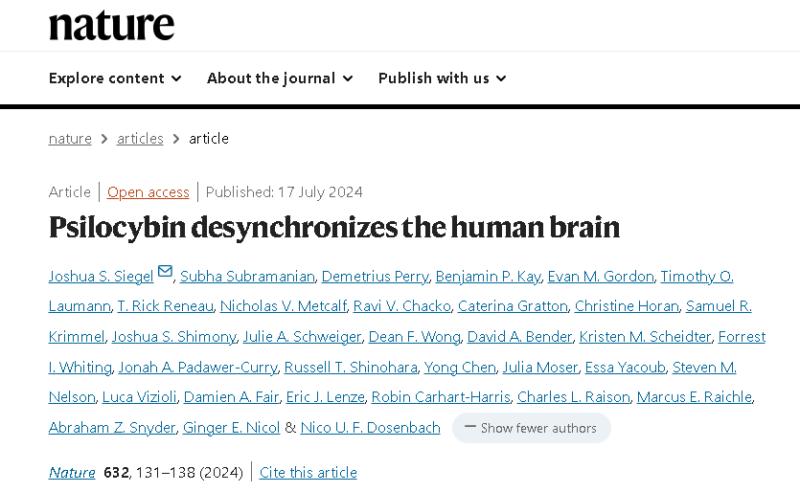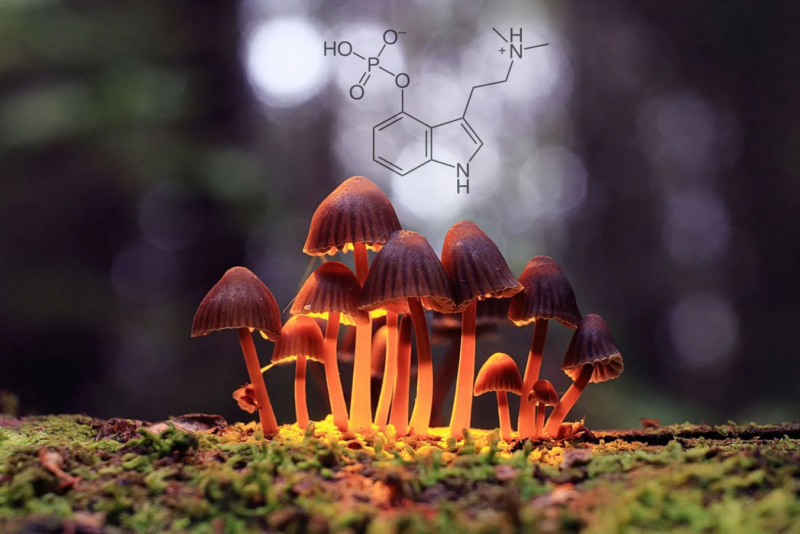The Babak Lab shared a post on LinkedIn about a paper by Joshua Siegel et al. titled “Psilocybin desynchronizes the human brain” published in Nature.
Authors: Joshua Siegel, Subha Subramanian, Demetrius Perry, Ginger Nicol, Nico Dosenbach et al.

“Scientific Wednesday: New Insights on Psilocybin’s Impact on the Human Brain.
Exciting research by Joshua S. Siegel, Subha Subramanian, Demetrius Perry, et al. published in Nature Portfolio reveals how a single dose of psilocybin can profoundly alter brain connectivity. The study, using precision functional mapping, tracked healthy adults before, during, and after administering psilocybin.
The findings? Psilocybin significantly disrupts functional connectivity (FC) across the brain, with the most substantial changes occurring in the Default Mode Network (DMN), which is crucial for our sense of self, time, and space.
Key Highlights:
- Desynchronization of Brain Networks
Psilocybin significantly disrupts functional connectivity in the brain, notably more than methylphenidate. This desynchronization affects both cortical and subcortical regions.
- Focus on the Default Mode Network (DMN)
The strongest effects were observed in the DMN, which is linked to self-perception, space, and time. Changes in connectivity here might relate to the therapeutic effects of psilocybin.
- Subjective Experience Correlation
Individual differences in brain connectivity changes were strongly linked to subjective experiences reported during the psychedelic state.
- Task Engagement
Performing perceptual tasks reduced the extent of brain network disruption, suggesting potential strategies for managing intense psychedelic experiences.
- Therapeutic Potential
These findings could explain the rapid and sustained therapeutic effects of psilocybin in treating depression and anxiety.
As the research progresses, psilocybin’s role in mental health treatment becomes increasingly clear. The persistent changes in brain connectivity might be the key to unlocking its full therapeutic potential.
Find out more details in the original article.”
Maria Babak shared this post, adding:
“If you’re curious about the science behind these promising therapies, this is definitely worth your time!
This article sheds light on the groundbreaking effects of psilocybin on brain connectivity, revealing how it disrupts and reconfigures neural networks in ways that might explain its powerful therapeutic benefits.
It’s a must-read for anyone interested in the future of mental health treatments and how psychedelics could revolutionize our approach to conditions like depression and anxiety.”

Sources: The Babak Lab/LinkedIn and Maria Babak/LinkedIn
Dr. Maria (Masha) Babak is the Head of The Babak Lab and an Assistant Professor at the City University of Hong Kong. In November 2020, she joined the City University of Hong Kong as an assistant professor. Dr. Babak received the Graeme Hanson-AsBIC Early Career Award in 2022.
Her research interests are at the intersection of chemistry, biology, and medicine, with a focus on the discovery and preclinical development of anticancer drugs for resistant and aggressive cancers with limited treatment options, such as malignant pleural mesothelioma and brain metastases.
Joshua S. Siegel is a researcher at Washington University School of Medicine’s Department of Psychiatry, focusing on neuroimaging to study the effects of ketamine, psilocybin, and related molecules on homeostatic plasticity.
He founded WU’s Program in Psychedelics Research, serves as Deputy Editor of the Journal of Psychedelic Psychiatry, created the graduate course “Mechanisms of Rapid Antidepressants,” founded the WU Rapid Antidepressants Journal Club, and advises psychedelics startups.


